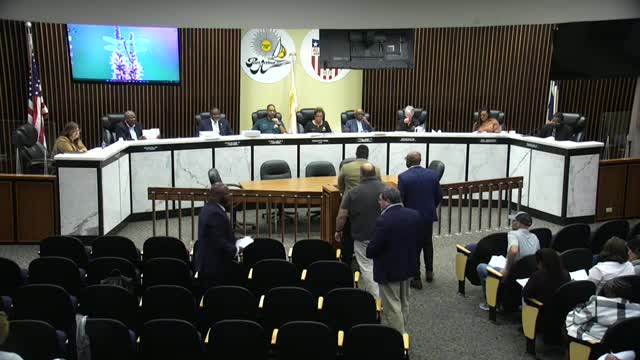Port Arthur council hears plan to modernize landfill; schedules workshop after questions about scope and RFQ
Get AI-powered insights, summaries, and transcripts
Subscribe
Summary
Environmental Industrial Services Group proposed a city public‑private partnership to modernize and expand the Port Arthur Landfill, saying it would fund equipment and upgrades while the city retained land ownership.
Environmental Industrial Services Group (EISG) told the Port Arthur City Council on Oct. 21 that it can modernize and expand the city landfill with no up‑front city capital, retain city landfill employees and build industrial waste capacity within 12–18 months.
The proposal, presented by a speaker identified in the meeting as Peter of Environmental Industrial Services Group, outlined a three‑phase plan to upgrade municipal solid waste operations, add industrial cells and equipment, and pursue market capture through transfer stations in surrounding counties. EISG said the project would require regulatory amendments to allow industrial waste, and estimated initial industrial revenues of about $5 million annually with longer‑term growth.
The presentation emphasized a public‑private partnership model in which “the city retains ownership and oversight, while EISG provides the capital, expertise, and execution,” Peter said. He said EISG would fund equipment and site upgrades and train retained city landfill staff.
Why it matters: Council members pressed whether the company’s proposal matched the specific request for qualifications (RFQ) the city issued. Multiple council members said their understanding of the RFQ was that it sought proposals primarily for the industrial portion of the landfill, not operation of the entire facility under a contractor. Council members repeatedly returned to whether the city would be turning day‑to‑day operations over to the contractor and whether the city would retain permits and property.
Council responses and next steps
- Council member Doucette framed the presentation in plain terms: “Basically, what we're talking about here is us contracting the landfill … we no longer gonna be operating,” and asked whether the proposal equated to turning operational control to the firm. EISG representatives answered that the permit and property would stay with the city and that EISG would be the operator under contract.
- Council member Bremerfeld and others noted the landfill’s recent history — it was once in deficit and later benefited from large volumes of clean fill tied to regional projects — and warned that the city should not give away an asset that currently produces revenue without full scrutiny.
- Council member Bremerfeld asked staff to clarify the RFQ: whether the city had solicited proposals for just an industrial cell or for entire landfill management. City staff present said the RFQ language included development, construction management and operation and that the firm had responded to the solicitation for industrial waste operations. Some council members said they had understood the RFQ differently; staff said a pre‑bid meeting had discussed the industrial focus.
- City staff and the EISG team told council that different phases would take place over months — Phase 1 (foundation and permitting, month 1–12), Phase 2 (construction and equipment, months 12–18) and Phase 3 (market capture through month 36) — and that industrial intake would not be customer‑facing until permits and infrastructure were in place.
Council direction and procedural follow‑up
The council did not take a formal vote to approve any contract or to award the landfill to EISG during the meeting. Instead the body directed staff to schedule a workshop to examine the RFQ, the proposed contract terms, permitting implications, and financial impacts. City Manager proposed and the council agreed to set the workshop in the first week of November and asked EISG to return with more detailed answers and documentation tied to the RFQ and permitting path.
What remains uncertain
- Scope and timing of permitting needed to add industrial waste under the landfill’s permit were not finalized during the meeting; staff said the process would drive the timeline. - Financial projections presented by EISG (initial industrial revenue estimates and long‑range projections) were high‑level; council members requested more detailed, auditable assumptions. - Contract structure, including how revenue would be shared or retained and whether the city would continue to fund capital replacements, requires legal and financial review.
Quotes and attributions
“We're very honored here to present to you today our plan to optimize the Port Arthur Landfill,” Peter said during the presentation.
“Basically, what we're talking about here is us contracting the landfill,” Council member Doucette said during discussion.
Ending
The council stopped short of approving any contract and set a workshop so members can review the RFQ, permit issues and the company's proposed agreement in depth. City staff will return to council with a clearer mapping of the RFQ language, proposed contract terms and the regulatory path required to accept industrial waste.
